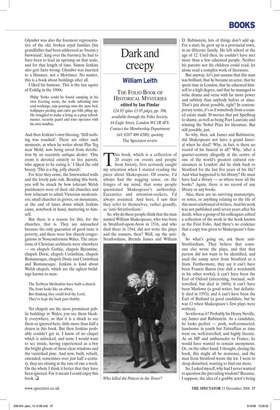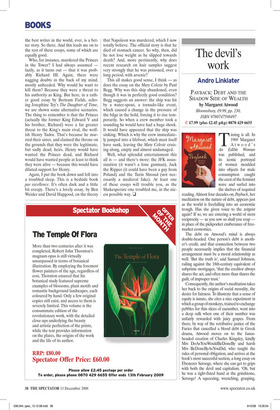Dark and creepy
William Leith
THE FOLIO BOOK OF HISTORICAL MYSTERIES edited by Ian Pindar £24.95 (plus £3.95 p&p), pp. 396, available through the Folio Society, 44 Eagle Street, London WC1R 4FS. Contact the Membership Department (tel: 0207 400 4200), quoting The Spectator review This book, which is a collection of 20 essays on events and people from history, first seriously caught my attention when I started reading the piece about Shakespeare. Of course, I’d always had the nagging sense, on the fringes of my mind, that some people questioned Shakespeare’s authorship. Eccentrics and attention-seekers, I’d always assumed. And here, I saw that they refer to themselves, rather grandly, as ‘anti-Stratfordians’.
So, why do these people think that the man named William Shakespeare, who was born in Stratford-upon-Avon in 1516, and who died there in 1564, did not write the plays and the sonnets, then? Well, say the antiStratfordians, Brenda James and William D. Rubinstein, lots of things don’t add up. For a start, he grew up in a provincial town, in an illiterate family. He left school at the age of 12. Until then, he couldn’t have met more than a few educated people. Neither his parents nor his children could read, let alone read a complex work of literature.
But anyway, let’s just assume that this man was brilliant, that he became an actor, that he spent time in London, that he educated himself to a high degree, and that he managed to write drama and verse with far more power and subtlety than anybody before or since. That’s just about possible, right? In contemporary terms, it’s as if somebody from a council estate made 30 movies that put Spielberg to shame, as well as being Poet Laureate and winning the Nobel Prize for literature. But still possible, just.
So why, then, ask James and Rubinstein, did Shakespeare not have a grand funeral when he died? Why, in fact, is there no record of his funeral at all? Why, ‘after a quarter-century allegedly at the centre of one of the world’s greatest cultural renaissances in London’ did he slink back to Stratford for the last five years of his life? And what happened to his library? He must have had a library — so where were all the books? Again, there is no record of any library or any books.
Also, there are no surviving manuscripts, or notes, or anything relating to the life of this most celebrated of writers. And his work was not published until seven years after his death, when a group of his colleagues edited a collection of the work in the book known as the First Folio. And there’s no evidence that a copy was given to Shakespeare’s family.
So what’s going on, ask these antiStratfordians. They believe that someone else wrote the plays, and that that person did not want to be identified, and used the canny actor from Stratford as a front. Furthermore, they say it can’t have been Francis Bacon (too dull a wordsmith in his other works); it can’t have been the Earl of Oxford (interesting, bisexual, welltravelled, but died in 1604); it can’t have been Marlowe (a good writer, but definitely died in 1593); and it can’t have been the Earl of Rutland (a good candidate, but he was 13 when Shakespeare’s first plays were written).
So who was it? Probably Sir Henry Neville, say James and Rubinstein. As a candidate, he looks perfect — posh, well-connected, handsome in youth but Falstaffian as time went on, well-travelled, and highly literate. As an MP and ambassador to France, he would have wanted to remain anonymous. Or, on the other hand, I thought, closing the book, this might all be nonsense, and the man from Stratford wrote the lot. I went to sleep disturbed, wanting to find out more.
So, I asked myself, why had I never wanted to question the prevailing wisdom? Because, I suppose, the idea of a grubby actor’s being the best writer in the world, ever, is a better story. So there. And this leads me on to the rest of these essays, some of which are equally good.
Who, for instance, murdered the Princes in the Tower? I had always assumed — lazily, as it turns out — that it was probably Richard III. Again, there were nagging doubts in the back of my mind, mostly unheeded. Why would he want to kill them? Because they were a threat to his authority as King. But here, in a rather good essay by Bertram Fields, echoing Josephine Tey’s The Daughter of Time, we are shown some alternative scenarios. The thing to remember is that the Princes (actually the former King Edward V and his brother, Richard) were a far greater threat to the King’s main rival, the wolfish Henry Tudor. That’s because he married their sister, and claimed the throne on the grounds that they were the legitimate, but sadly dead, heirs. Henry would have wanted the Princes dead, and Richard would have wanted people at least to think they were alive — because this would have diluted support for Henry.
Again, I put the book down and fell into a troubled sleep. This is a bedside book par excellence. It’s often dark and a little bit creepy. There’s a lovely essay, by Ben Weider and David Hapgood, on the theory that Napoleon was murdered, which I now totally believe. The official story is that he died of stomach cancer. So why, then, did he not lose weight as he slipped towards death? And, more pertinently, why does recent research on hair samples suggest very strongly that he was poisoned, over a long period, with arsenic?
This all makes good sense, I think — as does the essay on the Mary Celeste by Paul Begg. Why was this ship abandoned, even though it was in perfectly good condition? Begg suggests an answer: the ship was hit by a water-spout, a tornado-like event, which caused a change in the pressure of the bilge in the hold, forcing it to rise temporarily. So when a crew member took a sounding he would have had a huge shock. It would have appeared that the ship was sinking. Which is why the crew immediately jumped into a lifeboat, which must itself have sunk, leaving the Mary Celeste cruising along, empty and almost undamaged.
Well, what splendid entertainment this all is — and there’s more: the JFK assassination (it wasn’t a lone gunman), Jack the Ripper (it could have been a guy from Poland) and the Turin Shroud (not necessarily a medieval fake). At least one of these essays will trouble you, as the
44 ge 1
Shakesperare one troubled me, in the nicest possible way. q











































































 Previous page
Previous page